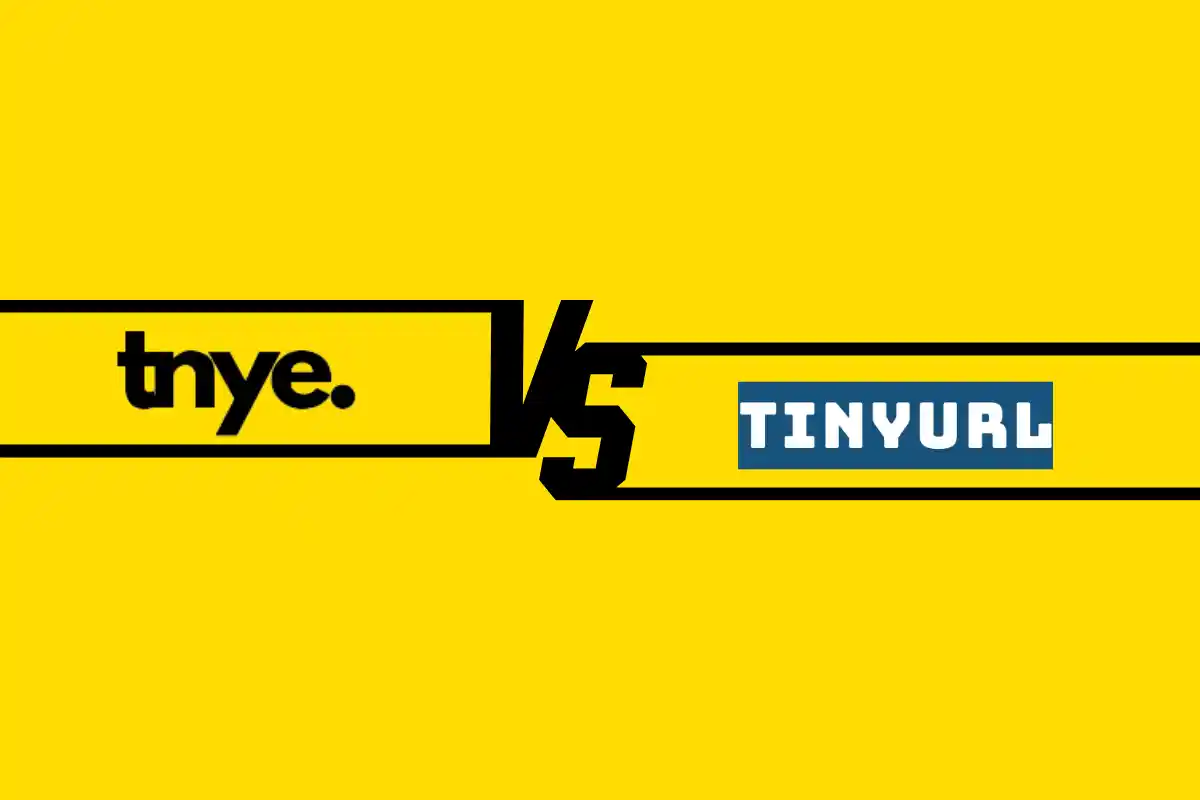In today’s digital landscape, URL shorteners are essential tools for businesses looking to streamline and track their online marketing efforts. Among the many options available, Tnye and TinyURL stand out as two popular choices.
Each has its unique features, but they also share common capabilities, making them both strong contenders for businesses.
This blog will compare Tnye and TinyURL, focusing on their key features, advantages, and drawbacks. We’ll help you understand which tool is better suited to your needs, whether you’re looking for something simple and reliable or a more feature-packed option.
By the end, you’ll have the information needed to make an informed decision about the best URL shortener for your business.
Overview of Tnye
Tnye is a versatile and growing URL shortening tool designed with business owners in mind. Beyond simply shortening links, it offers a wide array of additional features aimed at enhancing your online presence.
These include QR code generation, DNS lookup, and deep linking, which are tools that can significantly improve customer engagement and tracking.
One standout feature of Tnye is its ability to provide password-protected links, ensuring that businesses can share sensitive information securely.
Additionally, it offers a binary converter and Morse converter, which could appeal to businesses in specific industries or tech fields looking for unique solutions. Tnye’s platform also allows businesses to create custom, branded links, a vital feature for branding and marketing efforts.
While Tnye is still growing in popularity, it’s already clear that the platform offers a high level of customization and versatility. It may not yet have as many third-party integrations as some competitors, but the platform’s range of features continues to expand.
This makes Tnye a solid choice for businesses looking for more than just a basic URL shortener and are interested in exploring additional tools as they scale their operations.
Overview of TinyURL
TinyURL is one of the most widely recognized URL shortening services. It is known for its simplicity and ease of use. Since its inception, it has been a go-to tool for businesses and individuals who need to create short links quickly without fuss.
Its key strength lies in its straightforward, no-frills approach to link shortening, making it an ideal choice for those who prioritize efficiency.
TinyURL allows users to create custom short links, which helps businesses brand their URLs and make them more recognizable.
The platform also provides browser extensions, making it even easier for businesses to shorten links directly from their web browsers without having to go through a website interface.
One of TinyURL’s most notable aspects is its longevity and reliability. It has been around for years, gaining trust among its users and offering stability for businesses that want a tool they can rely on.
However, despite its popularity, TinyURL lacks many of the advanced features offered by newer URL shorteners, such as analytics or integrations with third-party applications.
That said, TinyURL is still a solid choice for businesses looking for a simple, dependable solution for shortening links.
Its simplicity, wide usage, and trusted reputation make it a strong contender for small and medium-sized businesses that need a no-hassle tool to create clean, custom links.
Feature Comparison: Tnye vs TinyURL
When choosing between Tnye and TinyURL, it’s essential to compare their features. Both platforms offer basic URL shortening services, but each has unique capabilities that could make one a better fit for your business needs.
Let’s take a look at the key features that differentiate the two.
Custom URL Branding
Both Tnye and TinyURL allow businesses to customize their short links, which is a critical feature for branding. However, Tnye offers more flexibility in this area, allowing businesses to create fully branded links that align with their marketing efforts.
While TinyURL does allow custom aliases, Tnye’s approach enables more personalized and dynamic branding options, making it ideal for businesses looking to reinforce their brand identity.
Advanced Tools and Features
Tnye stands out when it comes to offering a variety of additional tools beyond URL shortening. It provides QR code generation, DNS lookup, deep linking, and even more niche tools like text-to-speech or UTM link generation.
These extra features make Tnye particularly appealing for businesses that need more than just a simple URL shortening solution.
By comparison, TinyURL sticks to the basics. While it does allow custom link creation, it doesn’t have the same range of additional tools. It could be a limitation for businesses seeking a more comprehensive solution for their marketing needs.
Third-Party Integrations
Tnye offers third-party integration options, though not as many as some competitors. This feature is valuable for businesses that want to connect their link shortening with their existing software and workflows.
However, TinyURL doesn’t offer this feature, which means businesses that rely on integrations may find it limiting.
Security Features
Tnye offers password-protected links, a key feature for businesses looking to share sensitive information securely. TinyURL, on the other hand, doesn’t offer this feature, which may be a dealbreaker for businesses needing secure link sharing.
Tnye’s password protection adds an extra layer of security to ensure that only authorized users can access the content.
Analytics
TinyURL offers basic link tracking, but Tnye takes it a step further with more advanced analytics, allowing businesses to track link performance in detail. It is crucial for marketing teams that need insights into how their links are performing across various campaigns.
Tnye’s analytics capabilities can help you understand click-through rates, location of your audience, and much more.
Pros and Cons of Tnye
Tnye offers a variety of advanced tools and features, making it a solid choice for businesses looking for a comprehensive URL shortening solution. However, there are pros and cons to consider.
Pros:
- Wide array of additional tools (QR codes, DNS lookup, deep linking, etc.)
- Advanced analytics for better tracking and insights
- Ability to create password-protected links for added security
- Custom URL branding with high flexibility
- Growing platform with continuous feature updates
Cons:
- Fewer third-party integrations compared to other tools
- Relatively new, so it may not be as widely trusted as more established platforms
- Pricing models are not fully clarified yet, with premium features expected later
- Not as popular as TinyURL, which could affect user trust
Pros and Cons of TinyURL
TinyURL is a reliable and widely recognized tool known for its simplicity and ease of use. However, it’s important to evaluate its advantages and limitations before making a decision.
Pros:
- Simple and easy to use for quick link shortening
- Custom link aliasing for branding
- Reliable and trusted tool with long-standing market presence
- Browser extension for quick link shortening
- No need for an account to use basic features
Cons:
- Lacks advanced features like QR code generation, deep linking, or binary converters
- Limited analytics compared to Tnye
- No password protection for links
- Doesn’t support third-party integrations
- Basic customization options, less flexible than Tnye’s branding features
Use Cases: Who Should Use Tnye? Who Should Use TinyURL?
Choosing the right URL shortener depends on your specific business needs. Both Tnye and TinyURL offer different advantages, making them better suited to certain use cases.
Who Should Use Tnye?
Tnye is an ideal choice for businesses that require a comprehensive toolset for marketing, analytics, and security. It’s perfect for businesses that:
- Need advanced analytics to track link performance in detail.
- Require extra features like QR code generation, DNS lookup, or password-protected links.
- Want to integrate link shortening with other software systems, such as marketing platforms or CRM tools.
- Run campaigns where secure link sharing is necessary, and sensitive content needs protection.
- Want more flexibility in customizing links and creating branded URLs for their campaigns.
Who Should Use TinyURL?
TinyURL is a great fit for businesses that need a simple and reliable link shortener without the need for advanced features. It’s ideal for:
- Small businesses or personal users looking for a quick and easy way to shorten URLs.
- Those who don’t require detailed analytics or integrations but just need basic link shortening.
- Users who prefer a tried-and-true platform with a long-standing reputation.
- Those who want to create custom links without the need for extensive customization or security features.
Conclusion
Both Tnye and TinyURL have their strengths, so the right choice depends on your business needs. If you’re looking for a simple, no-frills tool, TinyURL is perfect for quick link shortening.
However, if your business requires more advanced features, detailed analytics, and additional tools, Tnye is the better option. It offers a broader range of functionalities, making it ideal for businesses that want more control over their link management and security.
In the end, the decision comes down to what features are most essential to your business goals.







